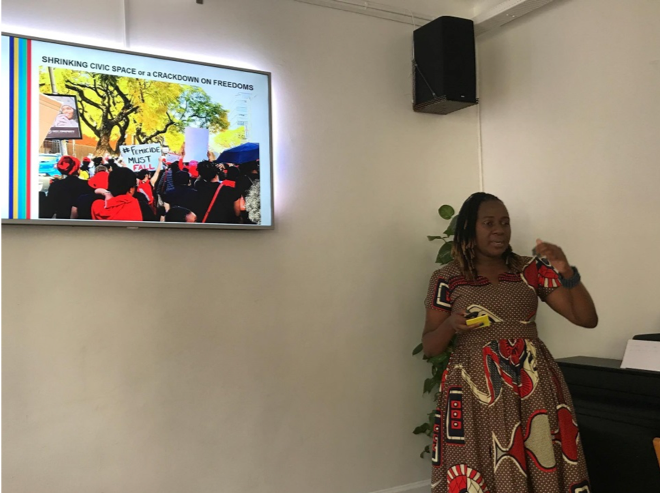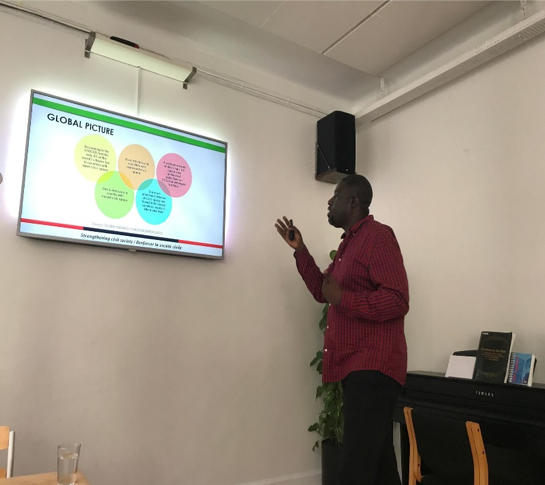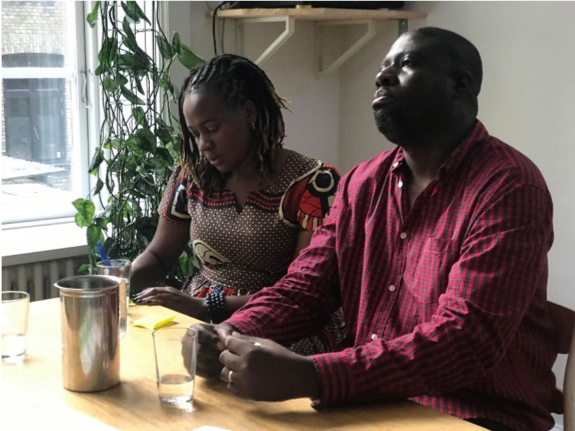Take-aways: Civil Society under pressure in Sub-Saharan Africa – What are the Effective ‘Push Back Efforts’?
On September 6th 2018, CISU and Global Focus hosted the second in a series of events focused on civic space. Invited to speak at the event was Teldah Mawarire from CIVICUS and Charles Kojo VanDyck from the West African Civil Society Institute, and they gave their perspectives on the state of civic space in Sub-Saharan Africa and West Africa respectively.
The state of civic space
 Mawarire started out by sharing her views on the definition of “shrinking civic space” and argued that this wording is in many cases misleading, since the concept – put this way – can be understood as a process that is happening without direct intervention from anyone, and this is far from the case. The shrinking of civic space that we are observing globally is part of an intentional effort by governments to silence dissidents and political opposition and this needs to be reflected in the discourse:
Mawarire started out by sharing her views on the definition of “shrinking civic space” and argued that this wording is in many cases misleading, since the concept – put this way – can be understood as a process that is happening without direct intervention from anyone, and this is far from the case. The shrinking of civic space that we are observing globally is part of an intentional effort by governments to silence dissidents and political opposition and this needs to be reflected in the discourse:
“There have been a lot of discussion about how the term “shrinking civic space” sanitizes the issue, makes it inaccessible to general population and does not reflect the severity of the problem at hand. I think we need to shy away from terms such as these and call it what it is a: A crackdown on civic freedoms.“
Charles Kojo VanDyck shared some insight into the extent of the problem using the CIVICUS monitor, which shows that only 6% of the populations in Africa live in countries which have open civic spaces, with the remaining 94% living in countries where civic space is either ‘narrowed’, ‘obstructed’ or ‘repressed’ or ‘closed’. VanDyck argued that the most effective way to counter the increasing amount of restrictive legislation by anti-democratic governments is to do what civil society does best: organize and educate people.
 A strong civil society is characterized by a high level of trust and social and cultural cohesion, and when these qualities are combined with a strong awareness of civil and human rights, it transforms civil society into a force to reckoned with, and one which decision makers can not overlook.
A strong civil society is characterized by a high level of trust and social and cultural cohesion, and when these qualities are combined with a strong awareness of civil and human rights, it transforms civil society into a force to reckoned with, and one which decision makers can not overlook.
In order to build their influential capacity CSOs must work on building relationships with individual members of parliament - an efficient strategy that VanDyck calls ‘quiet diplomacy’: By addressing and sharing knowledge with individuals it is possible to circumvent the often-unpredictable fluctuations of party-politics and gain influence which hopefully can create a ripple-effect within the political sphere.
African success stories
VanDyck shared some examples of cases where civil society organizations have effectively countered restrictive measures and legislation:
- In Nigeria in November 3, 2017 the Human Rights Agenda Network (HRAN) comprising 23 NGOs filed a suit at the Federal High Court in Abuja seeking the court to declare unconstitutional and unlawful the NGO Regulation Bill.
- In Mali in June 2017 the “Do not Touch my Constitution” campaign successfully forced the government to backtrack and suspend a planned referendum which could have expanded the powers of the President.
- In Ghana in 2016, Occupy Ghana, Media Foundation for West Africa, Ghana’s Centre for Democratic Development and other CSOs scuttled the efforts of Government to introduce the Interception of Postal Packets and Telecommunication Messages Bill popularly known as the spy bill.
- In Kenya, CSOs responded to government efforts to limit access to foreign funding in 2013 by providing evidence of the number of jobs that would be lost and the overall economic importance of the sector
The above stories of success reflect the combined strength of civil movements and CSO coalitions who work together and expose governments when they attempt to pass restrictive legislation, but as Teldah Mawarire argued, these strategies require civic space to be at least somewhat open:
“(…) [W]hile strategic litigation may work for countries rated obstructed or narrowed, it is unlikely to be effective in closed countries.”
In countries where civic space is either ‘obstructed’, ‘repressed’ or ‘closed’, legal processes are often compromised by government interventions, and defamation campaigns and the persecution of human rights defenders and activists help instill fear in people. Therefore, we as a global society need to speak up against anti-democratic governments and stand up for the oppressed. Embassy officials working in countries where civic space is restricted need to voice their dissent and expose local governments in order to build political pressure.
Not only will this serve as inspiration to the local populations who may be clueless about how to fight back, but such acts will also serve as much needed beacons of solidarity, which can help mobilize support and build international pressure.
 Mawarire and VanDyck both agreed that developing organizational resilience is of key importance for CSOs working within restricted civic spaces. As crackdowns on organisations are happening ever more frequently, CSOs in both international and local contexts need to be sharing experiences and strategies to counter government-led efforts to silence civil society. This includes seeking new ways of getting funding, since one of the most common measures imposed on civil society organisations are restrictions on international funding. Thus, CSOs working in local contexts must work to diversify their funding models and larger international CSOs must develop new ways of getting their funding to the frontlines where it is so desperately needed.
Mawarire and VanDyck both agreed that developing organizational resilience is of key importance for CSOs working within restricted civic spaces. As crackdowns on organisations are happening ever more frequently, CSOs in both international and local contexts need to be sharing experiences and strategies to counter government-led efforts to silence civil society. This includes seeking new ways of getting funding, since one of the most common measures imposed on civil society organisations are restrictions on international funding. Thus, CSOs working in local contexts must work to diversify their funding models and larger international CSOs must develop new ways of getting their funding to the frontlines where it is so desperately needed.
- Oprettet den .

